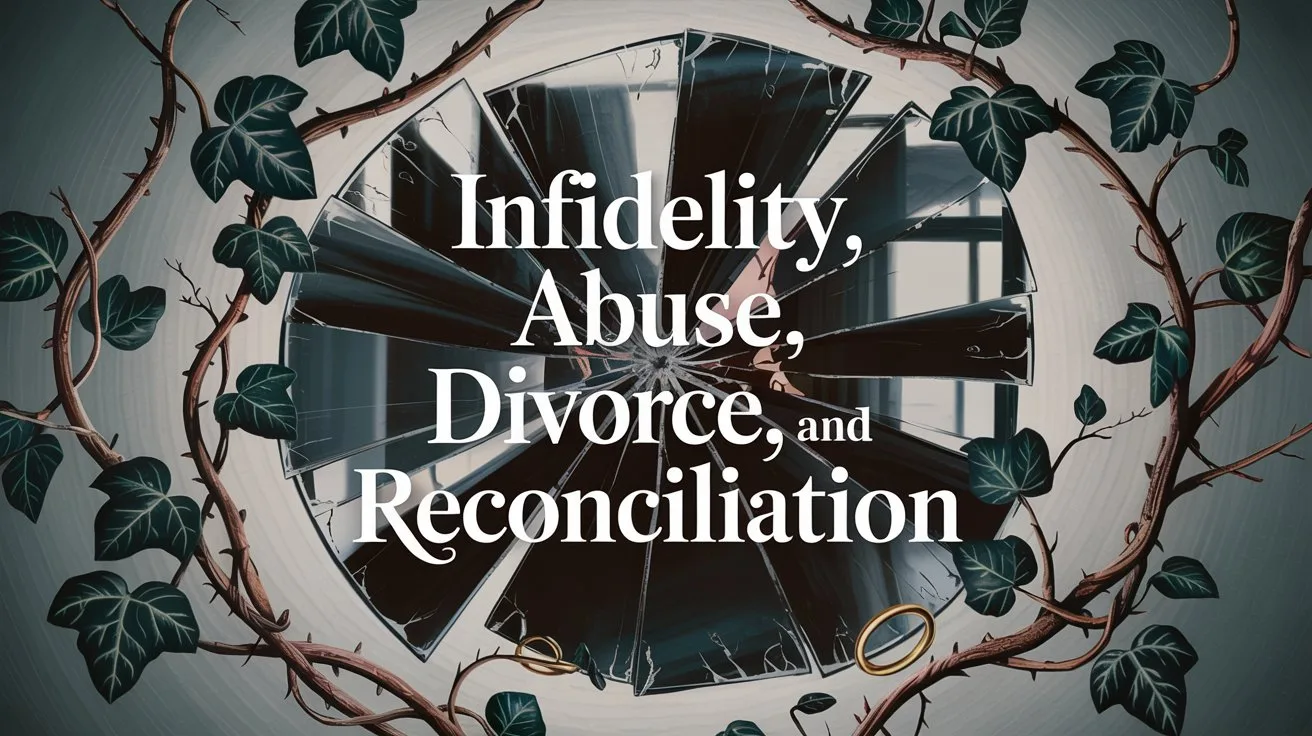Marriage is not merely a human institution. It is a covenant before God. Genesis 2:24 declares,
“Therefore a man shall leave his father and mother and be joined to his wife, and they shall become one flesh.”
Jesus affirms this in Matthew 19:5-6, saying,
“So then, they are no longer two but one flesh. Therefore what God has joined together, let not man separate.”
Marriage reflects Christ’s relationship with the Church (Ephesians 5:25-32), and as such, it is sacred, binding, and not to be broken lightly.
Infidelity: The Exception Clause
Jesus speaks very directly to divorce in Matthew 19:3-9. When the Pharisees test Him, asking if divorce is permitted “for just any reason,” Jesus roots His answer in creation. But then He gives one solemn exception:
“And I say to you, whoever divorces his wife, except for sexual immorality, and marries another, commits adultery” (Matthew 19:9).
The Greek word here is πορνεία (porneia), referring to sexual immorality or marital unfaithfulness. In this context, Jesus permits (but does not command) divorce in the case of infidelity. It is not required, but allowed.
Jeremiah 3:8 reveals that even God gave Israel a “certificate of divorce” because of her adulteries. This demons/”>demonstrates God’s patience, but also His justice. Unfaithfulness grieves Him, but He understands the profound breaking of covenant it causes.
Abuse: The Silent Crisis
Scripture does not explicitly mention physical abuse as grounds for divorce, but it does not endorse staying in harm’s way either. Ephesians 5:28-29 commands a husband to love his wife as his own body and nourish and cherish her. 1 Peter 3:7 says husbands are to dwell with their wives “with understanding,” and warns that their prayers will be hindered if they do not.
If a spouse is physically abusive, they are violating the very core of the marriage covenant. 1 Corinthians 7:10-11 offers a principle:
“A wife is not to depart from her husband. But even if she does depart, let her remain unmarried or be reconciled to her husband.”
This implies separation is allowable, especially for safety or sanctity. But remarriage is not encouraged unless reconciliation is impossible or porneia is present. Abuse is a form of violence, and Malachi 2:16 says,
“The LORD God of Israel says that He hates divorce, for it covers one’s garment with violence.”
God hates violence done in the name of covenant. He does not expect His children to remain under threat or suffering.
Should You Remain Single After Separation or Divorce?
1 Corinthians 7 gives detailed instructions for marital situations. Verse 15 is crucial:
“But if the unbeliever departs, let him depart; a brother or a sister is not under bondage in such cases. But God has called us to peace.”
If the spouse who is unfaithful or abusive refuses reconciliation or departs, the believer is “not under bondage.” This can be interpreted as release from the marriage covenant (especially in cases where repentance and restoration are not present).
However, Paul also says in verse 11 that a separated spouse should remain unmarried or be reconciled. This supports the idea that remarriage is only permissible when the covenant has been broken by infidelity or abandonment.
How to Handle an Unfaithful or Abusive Spouse
First and foremost, pray. Seek the Lord’s guidance. James 1:5 promises,
“If any of you lacks wisdom, let him ask of God… and it will be given to him.”
If your spouse has sinned, Matthew 18:15-17 outlines a biblical process of confrontation and restoration. There must be repentance. Luke 17:3 says,
“If your brother sins against you, rebuke him; and if he repents, forgive him.”
Forgiveness does not always mean immediate restoration (but it is the heart of Christ).
If there is no repentance, or repeated betrayal, separation may be necessary. But if the offender is broken, seeks the Lord, and desires to rebuild (then reconciliation reflects the very heart of God).
Hosea is a prophetic picture of this. His wife was unfaithful, and yet God commanded him to love her still (because this is how God loves His wayward people (Hosea 3:1)).
The Sanctity of Marriage and God’s Heart for Reconciliation
God’s original design was never divorce. Malachi 2:14-16 portrays marriage as a holy covenant and says the Lord “seeks godly offspring,” urging spouses to
“take heed to your spirit, and let none deal treacherously with the wife of his youth.”
Reconciliation is always God’s desire when both hearts are surrendered to Him. 2 Corinthians 5:18 reminds us that
“God… has given us the ministry of reconciliation.”
If the Spirit of God is working in both partners, healing is possible (even from the deepest betrayal). Forgiveness is a command (Colossians 3:13), but trust must be rebuilt. Restoration is a process. And sometimes, separation is the wise and necessary first step.
But the goal should always be holiness, not personal happiness. And if two are willing to seek the Lord, He is able to restore what was broken.
My Final Thoughts
Marriage is a holy covenant, not a contract. Infidelity and abuse break that covenant, and the Word of God makes provision for those who suffer under those sins. While God allows for divorce in certain circumstances, His heart is always for healing, redemption, and reconciliation where possible.
If you’ve been betrayed or wounded, He sees. If you’re unsure whether to stay or go, seek His face. His Word is clear, and His Spirit will guide.
But remember this: God does not abandon the broken. He restores the fallen. And even if your marriage cannot be saved, your soul can be healed.
“The LORD is near to those who have a broken heart, And saves such as have a contrite spirit” (Psalm 34:18).





 Get the book that teaches you how to evangelize and disarm doctrines from every single major cult group today.
Get the book that teaches you how to evangelize and disarm doctrines from every single major cult group today.